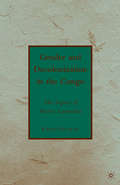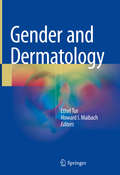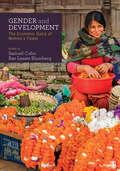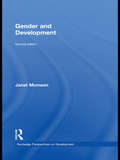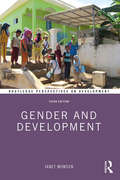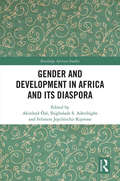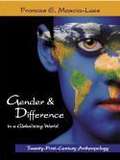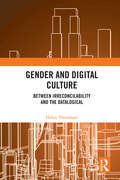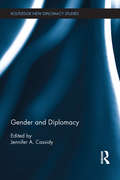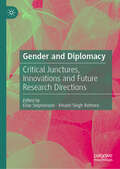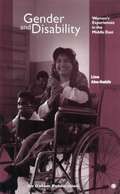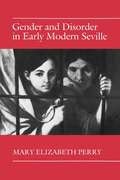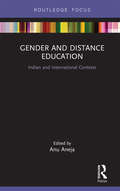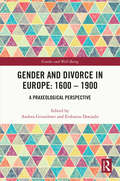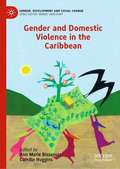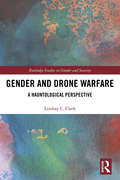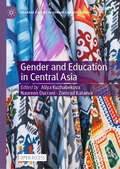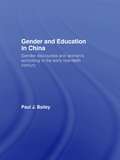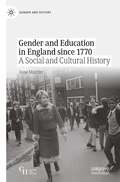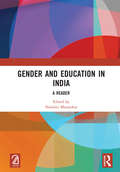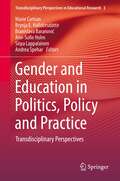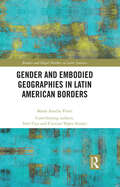- Table View
- List View
Gender and Decolonization in the Congo
by Karen BouwerGender and Decolonization in the Congo focuses on women and questions of gender in its examination of Patrice Lumumba (1925-1961), the assassinated leader of the independent Congo.
Gender and Dermatology
by Ethel Tur Howard I. MaibachThis book comprehensively reviews the characteristics of the body reflected in the skin due to differences in gender. It investigates the genetic and hormonal differences that can affect skin structure and function, and resulting in variations between women and men. The aging process and exogenous factors that differ according to differences in lifestyle between the sexes are also covered. Gender and Dermatology comprehensively outlines the various aspects of physiological differences between the skin of women and men using practical examples and review of the basic science. It is therefore an important clinically-relevant review for both the trainee and experienced practitioner in dermatology, primary care, geriatrics and immunology, while also being of interest to researchers in genetics and metabolic medicine.
Gender and Development: The Economic Basis of Women's Power
by Samuel R. Cohn Rae Lesser BlumbergDrawing from the leading scholarship in the field, Gender and Development: The Economic Basis of Women's Power helps you to develop a foundational understanding of the significant role that gender plays in developing societies. Award-winning scholars Samuel Cohn and Rae Lesser Blumberg have carefully selected and edited a collection of readings that encourage you to think critically about the economic power (or lack thereof) of women, and apply key concepts and theory related to gender and current development issues. From women’s participation in labor markets to their financial autonomy and purchasing power, these readings enable you to explore the economic implications of female power and the importance of women’s strategic indispensability.
Gender and Development: The Economic Basis of Women's Power
by Samuel R. Cohn Rae Lesser BlumbergDrawing from the leading scholarship in the field, Gender and Development: The Economic Basis of Women's Power helps you to develop a foundational understanding of the significant role that gender plays in developing societies. Award-winning scholars Samuel Cohn and Rae Lesser Blumberg have carefully selected and edited a collection of readings that encourage you to think critically about the economic power (or lack thereof) of women, and apply key concepts and theory related to gender and current development issues. From women’s participation in labor markets to their financial autonomy and purchasing power, these readings enable you to explore the economic implications of female power and the importance of women’s strategic indispensability.
Gender and Development (Routledge Perspectives on Development)
by Janet MomsenGlobal financial problems, rising food prices, climate change, international migration - increasingly by women - conflict situations in many poor countries, the spread of tropical diseases such as malaria and dengue fever and the increased incidence of HIV/AIDS and TB, and changing patterns of trade have all added new dimensions to gender issues in developing countries. These problems are frequently being brought to public attention in the media and through long-haul tourism. Consequently students' interest in gender and development has grown considerably in the last few years. This updated second edition provides a concise, accessible introduction to Gender and Development issues in the developing world and in the transition countries of Eastern and Central Europe. The nine chapters include discussions on changes in theoretical approaches, gender complexities and the Millennium Development Goals; social and biological reproduction including differing attitudes to family planning by states and variation in education and access to housing; differences in health and violence at major life stages for women and men and natural disasters and gender roles in rural and urban areas. The penultimate chapter considers the impact of broad economic changes such as the globalization of trade and communications on gender differences in economic activity and the final chapter addresses international progress towards gender equality as measured by the global gender gap. The text is particularly strong on environmental aspects and the new edition builds on this to consider the effects of climate change and declining natural resources illustrated by a case study of changing gender roles in fishing in India. There is also enhanced coverage of topics such as global trade, sport as a development tool, masculinities, and sustainable agriculture. Maps, statistics, references and boxed case studies have been updated throughout and their coverage widened. Gender and Development is the only broad based introduction to the topic written specifically for a student audience. It features student friendly items such as chapter learning objectives, discussion questions, annotated guides to further reading and websites. The text is enlivened throughout with examples and case studies drawn from the author's worldwide field research and consultancies with international development agencies over four decades and her experience of teaching the topic to undergraduates and postgraduates in many countries. It will be an essential text for a variety of courses on development, women's studies, sociology, anthropology and geography.
Gender and Development (Routledge Perspectives on Development)
by Janet MomsenThis revised and updated third edition of Gender and Development provides a concise, accessible introduction to gender and development issues in the developing world and in the transition countries of Eastern and Central Europe. The nine chapters include discussions on: changes in theoretical approaches, gender complexities and the Sustainable Development Goals; social and biological reproduction including changing attitudes to family planning; variation in education and access to housing; differences in health and violence at major life stages for women and men; natural disasters, climate change and declining natural resources, and gender roles in rural and urban areas. There is also enhanced coverage of topics such as global trade, sport as a development tool, masculinities and sustainable agriculture. Maps, statistics, have been updated throughout and their coverage widened. New case studies have been added on Bangladesh, on violence in Peru and India, halal tourism and on garbage collection in the Maldives. The book features student-friendly items such as chapter learning objectives, discussion questions, annotated guides to further reading and websites. The text is enlivened throughout with examples and case studies drawn from the author’s worldwide field research and consultancies with international development agencies over four decades and her experience of teaching the topic to undergraduates and postgraduates in many countries. Gender and Development is the only broad-based introduction to the topic written specifically for a student audience. It will be an essential text for a variety of courses on development, women’s studies, sociology, anthropology and geography.
Gender and Development in Africa and Its Diaspora (Routledge African Studies)
by Akinloyè Òjó Ibigbolade S. Aderibigbe Felisters Jepchirchir KipronoThis book considers how the establishment and/or improvement of gender equality impacts on the social, economic, religious, cultural, environmental and political developments of human societies in Africa and its Diaspora. An interdisciplinary team of contributors examine the role of gender in development against the background of Africa’s convoluted and arduous history of state formation, slavery, colonialism, post-independence, nation-building and poverty. Each chapter highlights and stimulates further discussion on the struggles that many African and African Diaspora societies grapple with in the perplexing issue of gender and development - concentrating on gains that have been made and the challenges yet to be surmounted.
Gender and Difference in a Globalizing World:Twenty-First-Century Anthropology
by Frances E. Mascia-LeesIt exposes the strengths and weaknesses of different theoretical orientations used in anthropology to study gender, difference, power, and inequality including feminist anthropology; black feminist anthropology; lesbian/gay/bisexual/transgendered theory; practice, postcolonial, symbolic, and psychological anthropology; as well as social evolutionism, sociobiology, and evolutionary psychology, among others. Mascia-Lees combines core components of these perspectives with insightful analyses and ethnographic examples to illustrate how global events and transformations have molded and continue to shape gender identities, behaviors, and expectations and produce and sustain worldwide inequalities.
Gender and Digital Culture: Between Irreconcilability and the Datalogical
by Helen ThornhamGender and Digital Culture offers a unique contribution to the theoretical and methodological understandings of digital technology as inherently gendered and classed. The silences within, through and from the systems we experience every day, create inequalities that are deeply affective and constitute very real forms of algorithmic vulnerability. The book explores these lived and mundane algorithmic vulnerabilities across three interrelated research projects. These focus on recent digital phenomena including sexting, selfies and wearables, and particular decision-making systems used in health, education and social services. Central to this book are the themes of irreconcilability and the datalogical. It makes the case that feminism and gender politics have become increasingly irreconcilable with not only long-running debates around representation and embodiment, but also with conceptions of the technological, conceptions of the user and of the systems themselves. In keeping with longstanding feminist scholarship, these irreconcilabilities can be productive and generative; they can be used to interrogate the power politics of digital culture. By studying the lived and routine elements of digital technologies, Gender and Digital Culture asks about the many convolutions that are held together through the everyday use of these technologies, and the implications for how gender and technology are approached, discussed and theorised.
Gender and Diplomacy (Routledge New Diplomacy Studies)
by Jennifer A. CassidyThis volume provides a detailed discussion of the role of women in diplomacy and a global narrative of their current and historical role within it. The last century has seen the Ministries of Foreign Affairs (MFAs) experience seismic shifts in their policies concerning the entry, role and agency of women within their institutional make-up. Despite these changes, and the promise that true gender equality offers to the diplomatic craft, the role of women in the diplomatic sphere continues to remain overlooked, and placed on the fringes of diplomatic scholarship. This volume brings together established scholars and experienced diplomatic practitioners in an attempt to unveil the story of women in diplomacy, in a context which is historical, theoretical and empirical. In line with feminist critical thought, the objective of this volume is to theorize and empirically demonstrate the understanding of diplomacy as a gendered practice and study. The aims of are three-fold: 1) expose and confront the gender of diplomacy; 2) shed light on the historical involvement of women in diplomatic practice in spite of systemic barriers and restrictions, with a focus on critical junctures of diplomatic institutional formation and the diplomatic entitlements which were created for women at these junctures; 3) examine the current state of women in diplomacy and evaluate the rate of progress towards a gender-even playing field on the basis thereof. This book will be of much interest to students of diplomacy studies, gender studies, foreign policy and international relations.
Gender and Diplomacy: Critical Junctures, Innovations and Future Research Directions
by Elise Stephenson Khushi Singh RathoreThis edited collection aims to bring new contexts and research innovations to study the changing nature of gender in diplomacy. Whilst historically most diplomats were men, in the twenty-first century, the proportion of women (and others of diverse backgrounds) has increased markedly and in select cases, surpasses men. Digital diplomacy, glass cliffs, diplomatic gatekeeping, nation branding, queer and critical race studies and more have begun to be studied in the context of gender and diplomacy, raising new questions, in new contexts, and driving new innovations in diplomacy. How is diplomacy responding to these changes? How does gender, sexuality and race intersect to reproduce diplomatic relations? This edited collection unpacks the queering of diplomacy, the security/diplomacy nexus, gender and West/non-West distinctions in diplomacy, gender and foreign policy, and women in MFAs and foreign service.
Gender and Disability: Women's Experiences in the Middle East
by Lina Abu-HabibWomen with disabilities face a double discrimination, both in terms of gender and also of their particular disability. For many women their most punishing disability is the attitude taken to them by society. This book examines the situation of women with various types of disability in the Middle Eastern context, and describes the evolution of Oxfam's perspective on working with disabled women. It provides a general overview of the concept of disability and includes several case studies from the Lebanon, Yemen, and the Occupied Palestinian Territories. Each chapter looks at specific aspects of the issue, and personal histories from disabled women and members of organizations for disabled people provide gripping testimony.
Gender and Disorder in Early Modern Seville
by Mary Elizabeth PerrySet in Seville, Spain during the Counter-Reformation era, this book is about the place of women in society and how the church and the government tried to curtail the women's growth.
Gender and Distance Education: Indian and International Contexts
by Anu AnejaThis book investigates the intersection of gender and distance education from a feminist perspective and explores their contemporary innovative interfaces in Indian and international contexts. The key issues raised here include a re- investigation of the democratizing potential of distance education from a gendered perspective (especially in developing countries such as India), feminist pedagogical perspectives on the notion of transactional distance, the relationship between masculinity and gerontology from the perspective of non- traditional modes, and the interrelationships between gender and social media from a distance education perspective. As opposed to the conventional, physical classroom, the virtual classroom often occupies a de- privileged space in feminist pedagogical discussions, since it appears to align itself less easily with feminist praxes which encourage a free, intellectual exchange between teachers and students. By opening up various facets of the relationship between gender, distance education and feminist pedagogy, the book foregrounds the critical need to re- visit preconceived, unfavourable assumptions about this relationship and proposes mutually productive inter-linkages. It does so in the context of contemporary circumstances defined by the increasing use of virtual technology, the ongoing need for democratization of higher education and the constraints posed by consumerist trends. Lucid and topical, this Focus volume will be useful to scholars and researchers of higher education, open and distance education, feminist pedagogy, gender studies, feminism, masculinity, and women’s studies as well as practitioners and policymakers working in the education sector.
Gender and Divorce in Europe: A Praxeological Perspective (Gender and Well-Being)
by Andrea Griesebner Evdoxios DoxiadisGetting divorced and remarried are now common practices in European societies, even if the rules differ from one country to the next. Civil marriage law still echoes religious marriage law, which for centuries determined which persons could enter into marriage with each other and how validly contracted marriages could be ended. Religions and denominations also had different regulations regarding whether a divorce only ended marital obligations or also permitted remarriage during the lifetime of the divorced spouse. This book deals with predominantly handwritten documents of divorce proceedings from the British Isles to Western, Central and Southeastern Europe, and from 1600 to the 1930s. The praxeological analysis reveals the arguments and strategies put forward to obtain or prevent divorce, as well as the social and, above all, economic conditions and arrangements connected with divorce. The contributions break new ground by combining previously often separate fields of research and regions of investigation. It makes clear that the gender order doesn’t always run along religious lines, as was too often assumed. This book will be of interest to all scholars and students of economic, social, religious, cultural, legal and gender history as well as gender and well-being in a broader sense.
Gender and Domestic Violence in the Caribbean (Gender, Development and Social Change)
by Ann Marie Bissessar Camille HugginsDomestic violence, interpersonal violence, intimate partner violence, or gender-based violence continues to be a social problem that is rarely understood or discussed in many parts of society, worldwide. The same holds true in the Anglophone Caribbean. Most Caribbean societies are patriarchal in nature, as most men govern and create the political and economic landscape where citizens live. This edited volume brings together reputable scholars of rigorous academic research from various disciplines (e.g., political science, law, linguistics, criminology, nursing, social work and psychology) to clearly explain the conceptual definition of domestic violence within the Latin American and Caribbean region’s socio-political context. It will highlight who are the perpetrators as well as the victims of domestic violence and the consequences of allowing domestic violence to perpetuate in the region. This book is unique in the market today, as it is the only book grounded in the Caribbean providing a comprehensive overview of domestic violence with regards to the significance, victims, perpetrators, and the consequences.
Gender and Drone Warfare: A Hauntological Perspective (Routledge Studies in Gender and Security)
by Lindsay C. ClarkThis book investigates how drone warfare is deeply gendered and how this can be explored through the methodological framework of ‘Haunting’. Utilising original interview data from British Reaper drone crews, the book analyses the way killing by drones complicates traditional understandings of masculinity and femininity in warfare. As their role does not include physical risk, drone crews have been critiqued for failing to meet the masculine requirements necessary to be considered ‘warriors’ and have been derided for feminising war. However, this book argues that drone warfare, and the experiences of the crews, exceeds the traditional masculine/feminine binary and suggests a new approach to explore this issue. The framework of Haunting presented here draws on the insights of Jacques Derrida, Avery Gordon, and others to highlight four key themes – complex personhood, in/(hyper)visibility, disturbed temporality and power – as frames through which the intersection of gender and drone warfare can be examined. This book argues that Haunting provides a framework for both revealing and destabilising gendered binaries of use for feminist security studies and International Relations scholars, as well as shedding light on British drone warfare. This book will be of interest to students of gender studies, sociology, war studies, and critical security studies.
Gender and Education in Central Asia (Palgrave Studies in Gender and Education)
by Aliya Kuzhabekova Naureen Durrani Zumrad KataevaThis open access book brings together established and emerging scholars to explore policies, statistical trends and representative research on gender equity across post-Soviet Central Asia. The book provides an overview of policy development in the promotion of gender equity, a comparative summary of changes in gender equity indicators at various levels of education, and examples of current research on an array of issues relating to gender equity across the region. The chapters present a broad picture which will be relevant to scholars of educational reform, comparative education policy, international development and gender issues.
Gender and Education in China: Gender Discourses and Women's Schooling in the Early Twentieth Century (Routledge Contemporary China Series #Vol. 15)
by Paul J. BaileyGender and Education in China analyzes the significance, impact and nature of women's public education in China from its beginnings at the turn of the twentieth century. Educational change was an integral aspect of the early twentieth century state-building and modernizing reforms implemented by the Qing dynasty as a means of strengthening the foundations of dynastic rule and reinvigorating China's economy and society to ward off the threat of foreign imperialism. A significant feature of educational change during this period was the emergence of official and non-official schools for girls. Using primary evidence such as official documents, newspapers and journals, Paul Bailey analyzes the different rationales for women's education provided by officials, educators and reformers, and charts the course and practice of women's education describing how young women responded to the educational opportunities made available to them. Demonstrating how the representation of women and assumptions concerning their role in the household, society and polity underpinned subsequent gender discourses throughout the rest of the century, Gender and Education in China will appeal to students and scholars of Chinese history, gender studies, women's studies as well as an interest in the history of education.
Gender and Education in England since 1770: A Social and Cultural History (Gender and History)
by Jane MartinThis book takes a novel approach to the topic, combining biographical approaches and local history, a synthesis of sociological and historical literature, with new research to address a variety of themes and provide a comprehensive, rounded history demonstrating the entanglement of educational experience and the influence of different modes of discrimination and prejudice. Using the lens of gender, Jane Martin reassesses the gendered nature of the modern history of education and provides an overview of intertwined aspects of education, society, politics and power. Its organisation is user friendly, providing accessible information with regard to chronologies of legislation and key events to reflect constancy and change, whilst ‘mapping’ the larger political, economic, social and cultural contexts, making it ideal for use as a textbook or a resource for teachers and students.
Gender and Education in India: A Reader
by Simran LuthraExamining the complex linkages between gender and education in the Indian context forms part of a wider matrix of inquiry related to understanding gender and its intersections with class, caste, religion and region. The sixteen essays in this Reader by eminent scholars offer critical feminist perspectives covering many issues related to these linkages, examining ideologies, structural contexts, knowledge, pedagogy and experiences through a socio-historcal lens. They point to the range of sources and methods that can be used to uncover the linkages between gender and education such as quantitative data, literature, autobiographies, oral histories and ethnography. This book is co-published with Aakar Books, New Delhi. Taylor & Francis does not sell or distribute the print versions of this book in India, Pakistan, Nepal, Bhutan, Bangladesh and Sri Lanka.
Gender and Education in Politics, Policy and Practice: Transdisciplinary Perspectives (Transdisciplinary Perspectives in Educational Research #3)
by Marie Carlson Brynja E. Halldórsdóttir Branislava Baranović Ann-Sofie Holm Sirpa Lappalainen Andrea SpeharThis book presents ideas on education, gender and intersectionality through a transdisciplinary frame by crossing disciplinary and methodological borders. Exploring the diversity of educational settings ranging from early childhood to adult education, it brings together scholars from various disciplines to discuss, deconstruct and problematize gender and education in relation to several themes in a comparative, intersectional, local, national, regional and international perspective. Each chapter approaches the topic in an intersectional and/or transnational manner and creates powerful gendered educational knowledge. Questions addressed in the book include: What are the challenges or barriers to gender-equal education? How can we understand the gaps between formal policies and educational practices? The chapters in the book illustrate how gender and education are relevant and needed concepts within the field of transdisciplinary research. The authors hail from a range of countries, such as Croatia, Indonesia, Turkey, UK, as well as the Nordic region, and they critically examine gender and education at all levels and in diverse sectors, and with varied lenses, such as neoliberalism in education, and the inclusion of newcomers and refugees. The work also critically investigates programs and pedagogical approaches, culture and values, knowledge and identity in teacher education. The book further addresses criticisms of Western and Anglophone bias around “white feminism” and the norm of white, male and heterosexual privilege.
Gender and Elections
by Susan J. Carroll Richard L. FoxThe new edition of this book describes the role of gender in the American electoral process through the 2008 elections. It strikes a balance between highlighting the most important developments for women as voters and candidates in the 2008 elections and providing a deeper analysis of the ways that gender has helped shape electoral politics in the United States. Individual chapters demonstrate the importance of gender in understanding presidential elections, voter participation and turnout, voting choices, the participation of African American women, congressional elections, the support of political parties and women's organizations, candidate communications with voters, and state elections. This updated volume also includes new chapters that analyze the roles of Latinas in U. S. politics and chronicle the candidacies of Hillary Clinton and Sarah Palin.
Gender and Elections
by Susan J. Carroll Richard L. FoxThe third edition of Gender and Elections offers a systematic, lively, and multifaceted account of the role of gender in the electoral process through the 2012 elections. This timely yet enduring volume strikes a balance between highlighting the most important developments for women as voters and candidates in the 2012 elections and providing a more long-term, in-depth analysis of the ways that gender has helped shape the contours and outcomes of electoral politics in the United States. Individual chapters demonstrate the importance of gender in understanding and interpreting presidential elections, presidential and vice-presidential candidacies, voter participation and turnout, voting choices, congressional elections, the political involvement of Latinas, the participation of African American women, the support of political parties and women's organizations, candidate communications with voters, and state elections. Without question, Gender and Elections is the most comprehensive, reliable, and trustworthy resource on the role of gender in US electoral politics.
Gender and Embodied Geographies in Latin American Borders (Borders and Illegal Markets in Latin America)
by Maria Amelia Viteri Iréri Ceja Cristina Yépez ArroyoGender and Embodied Geographies in Latin American Borders is the first study of its kind to bring a gender perspective to studies on violence and "illegal markets" in the region. Analyzing the structural problems that create inequality and enable gendered violence in Mexico, Guatemala, Colombia, Ecuador, Peru, Bolivia, Brazil and Argentina, the authors offer a critique of the securitization of borders and the criminalization of human mobility, and propose alternatives to reduce violence. Newspaper reports on gender and the variables of violence, human trafficking, people smuggling, missing persons, victims and perpetrators uncover the production and reproduction of discourses and images related to violence. Interviews with strategic actors from nongovernmental organizations, academia, as well as public policy makers diversify the experiences from the different voices of authority. Gender and Embodied Geographies in Latin American Borders encourages us to continue to question silence, impunity, the restriction of mobility, the dehumanization of securitization policies and the institutionalization of gender violence. A welcomed must read for scholars, researchers, policy makers, and students of gender studies, security studies and migration.
